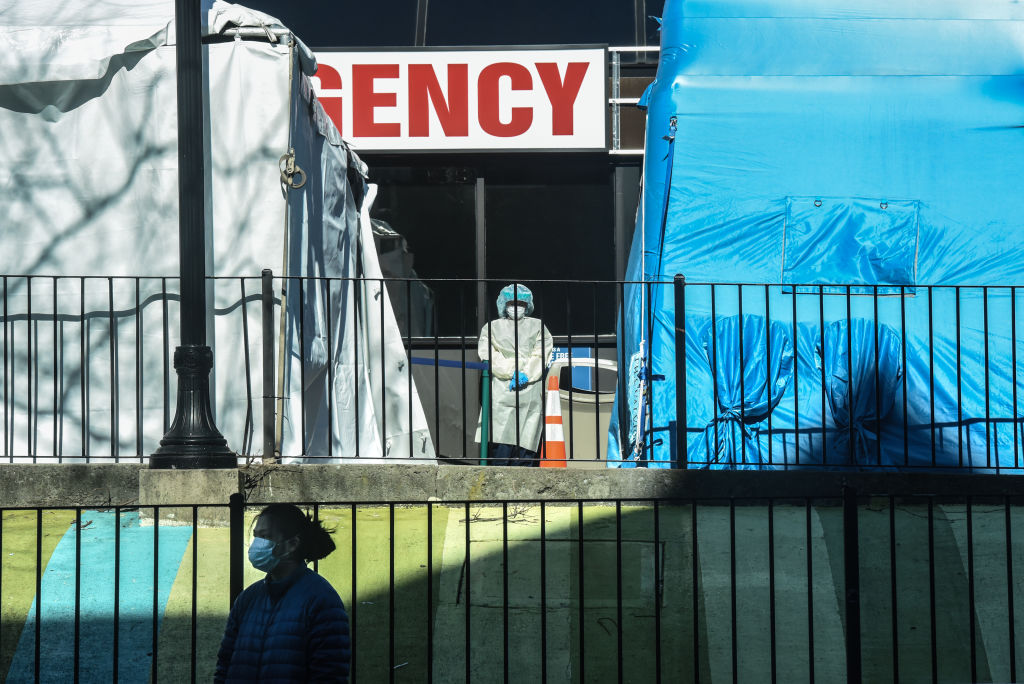These 3 scientific developments could help combat the coronavirus pandemic


A free daily email with the biggest news stories of the day – and the best features from TheWeek.com
You are now subscribed
Your newsletter sign-up was successful
Scientists remain hard at work in their efforts to combat the novel coronavirus pandemic and help alleviate the stress on health care systems.
At Stanford University, researchers are hoping to integrate already-on-the-market artificial intelligence called the Deterioration Index that can help doctors predict which coronavirus patients may need escalated care, thus allowing health care workers to spend less time analyzing charts and make treatment decisions more quickly, Stat News reports.
The AI analyzes vital signs, lab test results, medications, and medical history, then rates on a scale of 0 to 100 how high the risk is that a patient's condition deteriorates. The model is used in nearly 50 health systems already, but Stanford wants to make sure it works accurately for COVID-19 patients, as well, since it's a new disease the system wasn't intended to analyze.
The Week
Escape your echo chamber. Get the facts behind the news, plus analysis from multiple perspectives.

Sign up for The Week's Free Newsletters
From our morning news briefing to a weekly Good News Newsletter, get the best of The Week delivered directly to your inbox.
From our morning news briefing to a weekly Good News Newsletter, get the best of The Week delivered directly to your inbox.
In other news, two U.S. companies — BD and BioMedomics — launched a rapid antibody test that can detect if a person has present or past exposure to COVID-19 in as little as 15 minutes. Antibody tests could prove key for better understanding how widespread the pandemic is, and at what stage the world is at, because current coronavirus tests can't determine if a person has already recovered. Most importantly, they could help determine whether some health care workers can treat patients without concern of contracting the virus themselves, as well as allow some people who may have already built up immunity to return to their normal lives.
That doesn't mean firms are halting production of normal diagnostic tests, of course. The Boston Globe reports that researchers from Harvard University and the Massachusetts Institute of Technology are are working on a test that can deliver results in less than 15 minutes, which will hopefully add to the growing number of point-of-care tests hitting the market.
A free daily email with the biggest news stories of the day – and the best features from TheWeek.com
Tim is a staff writer at The Week and has contributed to Bedford and Bowery and The New York Transatlantic. He is a graduate of Occidental College and NYU's journalism school. Tim enjoys writing about baseball, Europe, and extinct megafauna. He lives in New York City.
-
 The ‘ravenous’ demand for Cornish minerals
The ‘ravenous’ demand for Cornish mineralsUnder the Radar Growing need for critical minerals to power tech has intensified ‘appetite’ for lithium, which could be a ‘huge boon’ for local economy
-
 Why are election experts taking Trump’s midterm threats seriously?
Why are election experts taking Trump’s midterm threats seriously?IN THE SPOTLIGHT As the president muses about polling place deployments and a centralized electoral system aimed at one-party control, lawmakers are taking this administration at its word
-
 ‘Restaurateurs have become millionaires’
‘Restaurateurs have become millionaires’Instant Opinion Opinion, comment and editorials of the day
-
 Trump HHS slashes advised child vaccinations
Trump HHS slashes advised child vaccinationsSpeed Read In a widely condemned move, the CDC will now recommend that children get vaccinated against 11 communicable diseases, not 17
-
 FDA OKs generic abortion pill, riling the right
FDA OKs generic abortion pill, riling the rightSpeed Read The drug in question is a generic version of mifepristone, used to carry out two-thirds of US abortions
-
 RFK Jr. vaccine panel advises restricting MMRV shot
RFK Jr. vaccine panel advises restricting MMRV shotSpeed Read The committee voted to restrict access to a childhood vaccine against chickenpox
-
 Texas declares end to measles outbreak
Texas declares end to measles outbreakSpeed Read The vaccine-preventable disease is still spreading in neighboring states, Mexico and Canada
-
 RFK Jr. shuts down mRNA vaccine funding at agency
RFK Jr. shuts down mRNA vaccine funding at agencySpeed Read The decision canceled or modified 22 projects, primarily for work on vaccines and therapeutics for respiratory viruses
-
 Measles cases surge to 33-year high
Measles cases surge to 33-year highSpeed Read The infection was declared eliminated from the US in 2000 but has seen a resurgence amid vaccine hesitancy
-
 Kennedy's vaccine panel signals skepticism, change
Kennedy's vaccine panel signals skepticism, changeSpeed Read RFK Jr.'s new vaccine advisory board intends to make changes to the decades-old US immunization system
-
 Kennedy ousts entire CDC vaccine advisory panel
Kennedy ousts entire CDC vaccine advisory panelspeed read Health Secretary RFK Jr. is a longtime anti-vaccine activist who has criticized the panel of experts
